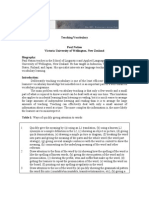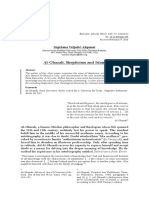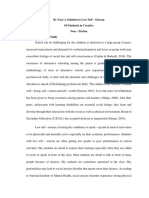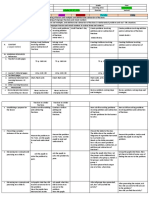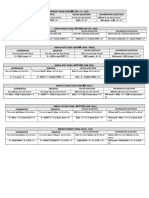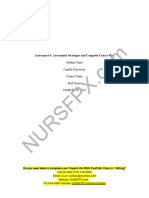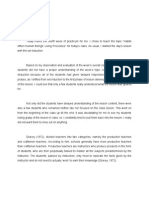American University of Sharjah | College of Engineering
1. Course Number and Course Title:
NGN 112 – Introduction to Artificial Intelligence and Data Science
2. Credits Hours:
3–0–3
3. Prerequisites and/or Co-Requisites:
Prerequisite: Admission to the College of Engineering
4. Name and Contact Information of Instructor:
Instructor: Dr. Ammar Hasan
Office: ESB 2147
Phone: 06- 515-4960
E-mail: amhasan@aus.edu
Office Hours: 11am-12pm on Tuesday/Thursday, or by appointment.
5. Course Description (Catalog Description):
Introduces Artificial Intelligence and Data Science basics. Covers data loading,
preprocessing, summarization and visualization. Covers basic AI and machine learning
applications using regression and classification techniques. Introduces artificial neural
networks and their applications in engineering. Uses programming tools to implement
simple data science and machine learning tasks.
6. Textbook and other Supplemental Material:
Textbook:
• Andreas C. Müller, Sarah Guido, Introduction to Machine Learning with Python:
A Guide for Data Scientists, 1st edition, O'Reilly Media, 2016.
Other supplemental material:
• Wes McKinney, Python for Data Analysis: Data Wrangling with pandas, NumPy,
and Jupyter, 3rd Edition, O’Reilly, 2022.
• Mark Lutz, Learning Python: Powerful Object-Oriented Programming, 5th
Edition, O’Reilly, 2013.
• Online Resources: Blackboard: http://ilearn.aus.edu/
• Software: Python
7. Learning Outcomes:
Upon completion of the course, students will be able to:
1. Identify the importance of Artificial Intelligence (AI) and Data Science for society.
1
� American University of Sharjah | College of Engineering
2. Perform data loading, preprocessing, summarization, and visualization.
3. Apply machine learning methods to solve basic regression and classification
problems.
4. Apply artificial neural networks (ANNs) to solve simple engineering problems.
5. Implement basic data science and machine learning tasks using programming tools.
8. Teaching and Learning Methodologies:
Methods include lectures, project-based learning, class discussions, and group work. The
course topics are covered with the use of available software packages to demonstrate the
concepts in a hands-on manner. Students’ learning is assessed via in-class quizzes,
exams, homework, and projects.
9. Course Topics and Schedule:
Topic Weeks
Introduction to Artificial Intelligence, Machine Learning, Week#1
and Intelligent Agents
Introduction to Python Programming #1 – Variables, Data Week#2
Types, Input and Output
Introduction to Python Programming #2 – Conditionals and Week#3
Loops
Introduction to Python Programming #3 – Numpy Week#4
Introduction to Python Programming #3 – Pandas Week#5
Introduction to Statistics using Python Week#6
Data loading, Visualization, and Preprocessing Week#7
Data Summarization for Data Science Applications Week#8
Midterm Exam Week#9
Introduction to Regression and Classification tasks Week#10
Applications of Regression in Engineering Week#11
Applications of Classification in Engineering Week#12
Introduction to Artificial Neural Networks Week#13
Applications of Artificial Neural Networks in Engineering Week#14
Importance and Issues of AI, AI Ethics Week#15
Final Exam Week#16
10. Schedule of Laboratory and other Non-Lecture Sessions:
There is no lab for this course.
2
� American University of Sharjah | College of Engineering
11. Out-of-Class Assignments with Due Dates:
Assignment Due Date (Sundays of)
HW1: Python Programming #1 Week#3
HW2: Python Programming #2 Week#5
HW3: Python Programming #3 Week#7
HW4: Data Summaries and Visualization Week#11
HW5: Classification and Regression Tasks Week#13
12. Student Evaluation:
Assessment Weight Dates (tentative)
Quiz 1: Week#2, Quiz 2: Week#4,
Quiz 3: Week#6, Quiz 4: Week#12,
Quizzes 25%
Quiz 5: Week#14
Note: Quizzes will be in the last class of the week.
Homework 10% cf. Section 11
Week#9, Saturday, October 26th, 2024, 11:00 a.m.
Midterm Exam 30%
to 1:00 p.m.
Final Exam 35% To be announced by Registrar’s Office
13. Course Learning Outcomes Assessment
Assessment Instrument CLOs Assessed
Quizzes O1 – O4
Homework O2 – O5
Midterm Exam O1 – O2
Final Exam O1 – O5
14. Contribution of Course to Program Outcomes
This course contributes to the accomplishment of the following program outcomes:
Emphasis in Course
Program Outcome
this course Outcomes(s)
(1) an ability to identify, formulate, and solve complex engineering
problems by applying principles of engineering, science, and ○ O2-O5
mathematics.
3
� American University of Sharjah | College of Engineering
(2) an ability to apply engineering design to produce solutions that
meet specified needs with consideration of public health, safety, and
welfare, as well as global, cultural, social, environmental, and
◑ O1, O3, O4
economic factors.
(3) an ability to communicate effectively with a range of audiences. ◑ O2-O5
(4) an ability to recognize ethical and professional responsibilities in
engineering situations and make informed judgments, which must
consider the impact of engineering solutions in global, economic,
environmental, and societal contexts.
(5) an ability to function effectively on a team whose members
together provide leadership, create a collaborative and inclusive ◑ O2-O5
environment, establish goals, plan tasks, and meet objectives.
(6) an ability to develop and conduct appropriate experimentation,
analyze and interpret data, and use engineering judgment to draw ◑ O2- O5
conclusions.
(7) an ability to acquire and apply new knowledge as needed, using
○ O3, O4
appropriate learning strategies.
Emphasis: ● High; ◑ Medium; ○ Low; Blank – Nothing Specific Expected
15. Letter Grade Policy
Total (T) Letter Grade
95 ≤ T A
90 ≤ T < 95 A-
85 ≤ T < 90 B+
80 ≤ T < 85 B
75 ≤ T < 80 B-
70 ≤ T < 75 C+
65 ≤ T < 70 C
60 ≤ T < 65 C-
55 ≤ T < 60 D
T < 55 F
16. Course Rules and Regulations
i) Academic Honesty:
The university's academic integrity policy will be strictly enforced. All forms of
academic dishonesty, including but not limited to cheating/ fabrication/ plagiarism/
multiple submissions/ aiding or abetting / illegal system access, are prohibited and will
be severely penalized. Please refer to the university rules related to academic integrity
outlined in the student handbook (Student Academic Integrity Code). Students
4
� American University of Sharjah | College of Engineering
involved in any form of academic dishonesty are likely to receive a grade of “F” for
the course, with further action to be recommended to the department chair/dean of the
College of Engineering.
ii) Attendance:
Attendance is vital for a better understanding of course material. Statistics have shown
that regular attendance can be correlated to higher grades in most cases. Please note the
following:
• If absent, you are still responsible for all the material/handouts given in class.
• Absence for more than 15% of classes (both lectures and recitations) will
automatically lead to a forced withdrawal from the class, in which case the student
will receive a grade WF on the transcript.
• Attendance will be taken at the beginning of each class, and students will be allowed
in the classroom at any time. Two late incidents will be counted as one absence.
iii) Class distractors: Please note the following:
• Use of mobile phones during the class is strictly prohibited. Violators will subject
themselves to immediate removal from their class.
• A ringing/beeping/vibrating mobile phone or engaging in side-talks not authorized
by the instructor is considered inappropriate class behavior.
• In order to avoid disturbance to your fellow colleagues, walking in and out of the
class during the lecture is discouraged unless deemed necessary.
iv) Grade curving:
There will be no curving up for the grades at the end of the semester unless deemed
absolutely necessary by the course instructor.
v) Generative AI tools:
The use of generative AI tools, including ChatGPT and other similar tools, to complete
or support the completion of any form of assignment or assessment in this course is not
allowed and would be considered academic misconduct.

































































